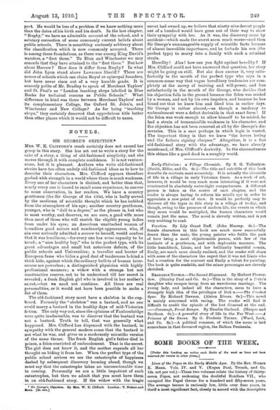NOVELS.
SIR GEORGE'S OBJECTION.*
Mus. W. K. CLIFFORD'S reach certainly does not exceed her grasp in this story. She has set out to write a story for the sake of a story, a thing of old-fashioned simplicity, and she moves through it with complete confidence. It is not venture- some, but it is pleasant. Authors who write old-fashioned stories have too often unduly old-fashioned ideas as to how to describe their characters. Mrs. Clifford appears therefore garbed with strength in a world where there is much weakness. Every one of her characters is distinct, and better than that, nearly every one is bound to recall some experience, to answer to some observation, in her readers. We have a country gentleman (the Sir George of the title), who is badly served by the modicum of scientific thought which he has imbibed from the atmosphere of his age ; another country gentleman, younger, who is "dull to a degree," as the phrase is, but who is most worthy, and deserves, we are sure, a good wife more than most of those who -will snatch the eligible young ladies from under his eyes ; an American unattached woman of boundless good nature and nondescript appearance, who, if she ever seriously admitted a sorrow to herself, would confess that it was loneliness,—for every one has some capacity to be loved ; a "nice healthy boy," who is the perfect type, with its great advantages and small but notorious defects, of the public schools and Universities ; a traveller and hunter of European fame who hides a good deal of tenderness behind a thick hide, against which the ordinary bullets of human inter- course are powerless ; a distinguished physician with highly professional manners ; a widow with a strange but not unattractive reserve, not to be understood till her secret is revealed ; a fresh English girl who is involved in her mother's se:...ret,—but we need not continue. All these are real personalities, or it would not have been possible to make a list of them.
The old-fashioned story must have a skeleton in the cup- board. Formerly the "skeleton" was a bastard, and no one could marry a bastard in the healthy days of mid-Victorian &Mon. The only way out, since the opinions of Faulconbridge were quite inadmissible, was to discover that the bastard was not a bastard. Truth to tell, that was generally what happened. Mrs. Clifford has dispensed with the bastard, in sympathy with the general modern sense that the bastard is not what he was, and gives us a moderately scientific version of the same theme. The fresh English girl's father died in prison, a felon convicted of embezzlement. That is the secret. The girl does not know it, and the mother expends all her thought on hiding it from her. When the perfect type of the public school arrives we see the catastrophe of happiness dashed by subsequent discovery looming ahead, though we must say that the catastrophe takes an unconscionable time in coming. Personally we are a little impatient of such catastrophes, but then we admit that you must have them in an old-fashioned story. If the widow with the tragic • Sir George's Objection. By Mrs. W. K. Clifford. London : T. Nelson and Goa& [2e. net.)
secret had owned up, we believe that ninety-nine decent people out of a hundred would have gone out of their way to show their sympathy with her. As it was, the discovery came by accident—which made the secret seem much worse—and then Sir George's unmanageable supply of scientific facts became of almost incredible importance, and he forbade his son (the perfect type) to marry into a family with such a criminal strain.
Heredity! Alas ! bow can you fight against heredity P If Mrs. Clifford could not have answered that question, her story might be going on still. But she does answer it, very satis- factorily in the month of the perfect type who says in a common-sense way that vague hereditary tendencies are com- pletely at the mercy of training and will-power, and less satisfactorily in the mouth of Sir George, who decides that his objection falls to the ground because the felon was misled by a woman, and not by his own impulses, and because he has found out that he knew him and liked him in earlier days. Sir George is rather absurd,—as though a tendency to embezzlement were a defect derivable in that exact form ! If the felon was weak enough to allow himself to be misled, he had a strain of transmissible weakness in his character, and the objection has not been removed at all by Sir George's dis- coveries. This is a ease perhaps in which logic is wasted. The important thing is that we leave "the lovers loving and the fathers signing cheques." Altogether, it is a fine old-fashioned story with the advantage, we have already mentioned, of Mrs. Clifford's dexterity. In the circumstances this shines like a good deed in a naughty world.






































 Previous page
Previous page